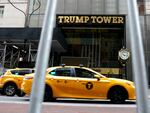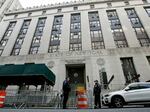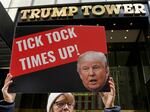
Barriers stand near Trump Tower in New York City on Friday.
Timothy A. Clary / AFP via Getty Images
The news of former President Donald Trump’s historic indictment has elicited strong reactions and raised plenty of questions. Key among them: What happens now?
A New York grand jury has voted to indict Trump for his alleged role in covering up hush money paid to adult film actress Stormy Daniels during his 2016 presidential election campaign. However, the indictment remains under seal, meaning the charges and evidence against him are not yet known.
NPR's Ilya Marritz, who covers Trump's legal affairs, told Morning Edition that a grand jury process is "secret by design."
"Until we read that indictment, we don't know the specific charges Trump will have to defend himself against," he added, "and that's a good reason to treat headlines and hot takes with a little bit of skepticism."
Still, we do know that the 23-person grand jury heard evidence in the case, including testimony from Daniels and Trump's former personal attorney, Michael Cohen. At least 12 members (a majority) decided there was enough reasonable cause to believe that Trump committed a crime.
District Attorney Alvin Bragg's office confirmed that decision on Thursday, saying it had contacted Trump's attorney "to coordinate his surrender" to authorities.
A spokesperson for the New York Office of Court Administration has since confirmed to NPR that Trump is expected to appear in court on Tuesday at 2:15 p.m. ET.
Trump would have to be arraigned in person
An indictment is typically unsealed on the day of a defendant's arraignment, according to Marritz.
That's when Trump would come in for photographs, fingerprints and paperwork, as well as to enter a plea, a process that typically takes several hours.
Bragg has said repeatedly that the justice system should treat a former president the same way as any other defendant, so Marritz thinks it's likely Trump will have to go through the typical steps of an arraignment.
Even so, his status is expected to pose some unusual logistical challenges.
"It's gonna involve lawyers, cops, the Secret Service, the ex-president himself," Marritz says. "Trump is not known for hiding from cameras, and I'm certain there will be a lot of cameras there."
The processing itself would take place behind closed doors. Typically, defendants then go before a judge to hear the charges against them and enter a plea.
Two of Trump's lawyers, who deny that he committed any crime, told Reuters on Friday that he will not be handcuffed when he arrives, and plans to enter a not guilty plea.
"This is the first time that it really seems likely that the former president of the United States will be having a mugshot, being fingerprinted and having not just this indictment ... but more indictments to come," presidential historian Douglas Brinkley tells Morning Edition. "So we're in for a very rocky spring."

New York police officers stand outside the Manhattan District Attorney's office in New York City on Friday.
Leonardo Munoz / AFP via Getty Images
The case could go to trial
Trump's indictment raises plenty of unique legal and political questions, given his former job and the fact that he's currently campaigning to hold it again.
But he's still entitled to the same due process as everyone else, says Kim Wehle, a former U.S. attorney and now a law professor at the University of Baltimore.
When asked about the potential charges against him and penalties they would carry, she says that's "way, way down the line," telling All Things Considered there are plenty of hurdles to get through first.
"There are a lot of procedural, evidentiary and constitutional protections in place to make sure that that far-off question is fairly adjudicated," Wehle adds.
Matthew Galluzzo, a former prosecutor in the New York County District Attorney's Office, says a possible conviction comes down to more than just the evidence — it's also about the people who are considering it.
A case can be strong in Manhattan and weak in Staten Island, just based on the makeup of the jury pool, he tells Morning Edition.
And Trump, who won 22.6% of New York City ballots in 2020, is widely unpopular in Manhattan — with Galluzzo calling him "possibly the most despised person on the island."
"If I had to pick which side to be on, and I had to win to save my life, I would probably choose to be on the prosecution's side simply because the jury pool in Manhattan is so incredibly against Donald Trump," he adds.

Protesters rally in front of Trump Tower in New York City on Friday.
Timothy A. Clary / AFP via Getty Images
That trial might not happen for a while
Galluzzo expects defense attorneys to argue that it won't be fair for Trump to get a fair trial in Manhattan and push to have it moved somewhere else.
And he doesn't think that's the only pretrial motion Trump's team will make.
Most similar cases would probably take a year to get to trial, Galluzzo says. He expects that Trump's strategy will be to delay that process as much as possible.
"If he can push this thing back until after the election then he can effectively win the trial that way," he says.
He says it is theoretically possible to delay a case some two or three years, using motions and appeals.
But the one thing he's not expecting to see is a settlement deal reached by the two parties.
"They're not gonna make him an offer that he would accept," he adds. "And I think more than anything he probably wants that public stage to play the victim, to have an audience."
Copyright 2023 NPR. To see more, visit https://www.npr.org.